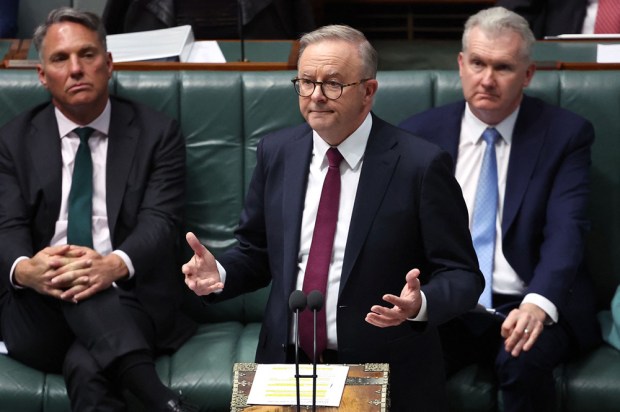Even in the ultra-secular world inhabited by the commentariat, there seems to be a need for a parade of devils to revile and angels to worship. Accordingly, Bronwyn Bishop has been nominated this season’s Great Satan, with footballer Adam Goodes declared l’ange du jour.
On Goodes, the 13-year-old girl who so rudely suggested he had simian-like qualities should have seen a lawyer. Her unlawful detention, her treatment and that of her family could have attracted a handsome settlement indeed. The fact that no other indigenous athlete is being booed similarly demonstrates that the reason cannot be race-related.
Having been subject to racist descriptions since I was a little boy, Goodes reaction seems to me unusually sensitive. A few years ago a republican site described me as a ‘perma-tanned Indonesian-born blow-in’. When I was a schoolboy even blunter terms were used, even by grown men. Sometimes this was playful, sometimes not. One thing I knew was never to whinge about it. This would only attract a far worse appellation from peers – a sook.
As to parliament, I shudder when I recall my last trip to Question Time. There were rows of well behaved schoolchildren watching. Exposing them to such excruciatingly infantile bad behaviour was not wise. Not only would they think poorly of the politicians concerned, they might think the same of Parliament itself and even of democracy. Worse, they might imitate this appalling behaviour.
Until things improve, schoolchildren should be dissuaded from viewing Question Time, which is now a parody of what happens at Westminster. Whoever is in power, half the questions laughably described as ‘without notice’ are made with the knowledge of the minister. Nor is the convention observed of MPs rising in their places to catch the Speaker’s eye. As in any authoritarian state, the right to ask a question is decided for our representatives. The current Parliament must be one of the worst behaved in the history of the Commonwealth, with ministers subjected to a cacophony of noisy and unamusing interjections. As the crescendo increases, the Speaker has been forced to issue warnings and then to order the offending members to leave the chamber. This has been used by both the opposition and the commentariat to declare, untruthfully, that in doing this the Speaker was biased .
For this and the fact she is a conservative, Bronwyn Bishop became a particular target for her expenses. But however much was spent has so far been found to be within the guidelines, which cannot be said of her persecutor-in-chief, Tony Burke, required to repay expenses claimed on 15 occasions.
The point is that neither parliamentary behaviour will be improved nor the expenses scandal corrected by making Bronwyn Bishop a scapegoat.
The principal problem with current parliamentary behaviour is that the commentariat has decided either to ignore or to play down the opposition’s sabotage of Question Time. If they continue this behaviour, the next speaker will be forced to do what Bronwyn Bishop was duty bound to do. Will he or she be also declared to be biased?
As to the expenses regime, the problem has been recognised by the Prime Minister who has ordered a review. The problem is simple. What may be acceptable under the guidelines is often unacceptable to the public. The regime just does not pass the pub test.
These guidelines are a mishmash of over a dozen pieces of legislation and government policy. And notwithstanding the valiant efforts of the Department of Finance, the regulations on key points have a certain vagueness about them.
It would be a serious mistake to set up a vast new piece of expensive machinery, an Independent Parliamentary Standards Authority, as the British did after their expenses scandal. This cost over six times the amount of the fiddles by delinquent politicians. They also made the mistake of giving the Authority the job of determining remuneration. So the body saving money with the one hand was seen to be giving away more with the other. They demonstrated this by recommending a ridiculous pay rise of 11 per cent when the public sector is getting 1 per cent. And as the coke-sniffing Lord Sewell has just demonstrated, no system will stop some politicians from behaving outrageously .
The guidelines should be varied to emphasise four overriding important principles.
The first is equality. When it comes to expenses, politicians should never be better off than other taxpayers.
A politician should only be allowed expenses in circumstances where, broadly speaking, the tax commissioner would allow an ordinary person a deduction. The government could appoint an inspector general to make rulings on this when required. These should be subject to appeal, but only at the cost of the appellant politician.
And why not make the politician pay for any travel and then seek reimbursement, something many employees have to do? That way they may appreciate more the sums involved.
The second overriding principle should be transparency and the third accountability. This could be achieved simply and cheaply by posting on a website all expenses paid each month to each politician, especially in the sensitive area of travel. This would include details of any official business involved. Just by exposing these claims to daylight, stretching the guidelines unacceptably will be discouraged.
The fourth important principle is that the taxpayers are entitled to value for their money. This will be achieved very much by letting in daylight.
There is one aspect where the nation is not getting value for its money, and where the politicians for once are not at fault. This is in the setting up and refurbishing electoral offices. This is managed exclusively by the department. During the last 6 months of 2014, this cost more than $4.5 million. Former PM Julia Gillard’s Adelaide office cost $454,412. These sums recall the inflated prices paid under the Building the Education Revolution. Such work should also be advertised for tender in the relevant electorate and neighbouring electorates so that local business people could offer to do it economically.
The public are entitled to expect that the commentariat and the opposition will do their duty to ensure that parliamentary standards improve and that the new expenses system will ensure equality, transparency, accountability and value for money.
Got something to add? Join the discussion and comment below.
Get 10 issues for just $10
Subscribe to The Spectator Australia today for the next 10 magazine issues, plus full online access, for just $10.
You might disagree with half of it, but you’ll enjoy reading all of it. Try your first month for free, then just $2 a week for the remainder of your first year.













Comments
Don't miss out
Join the conversation with other Spectator Australia readers. Subscribe to leave a comment.
SUBSCRIBEAlready a subscriber? Log in